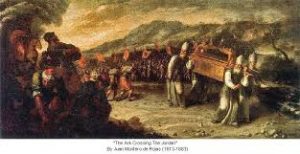Psalm 68

The opening words of Psalm 68 are the words Moses said whenever the Ark set out, ‘Rise up, Lord! May your enemies be scattered; may your foes flee before you.’ Numbers 10.35 The Ark representing God’s presence with his people took hundreds of years to travel from Sinai, the place where the law was given to Mount Zion (Jerusalem). One can imagine the words again being incorporated in the rejoicing as David accompanied the Ark into Jerusalem. David draws upon the song of Deborah as she described the Lord as being the God of Israel and Sinai where the mountains quaked, the earth shook and the heavens poured clouds down like water. Judges 5.4,5 David declares God is the ‘God who saves’ v20 based on the history of how God has fought for Israel from slavery in Egypt, through the desert and the giving of the law, on to the conquest of the promised land and up to the point where the Ark is now resident with God’s people in Jerusalem.
The wicked who perish before God v2 were probably the Egyptians who had for centuries enslaved Israel and the righteous who were glad and rejoicing before God v3 were the Israelites. Such simplified statements gloss over many complications, even doubt and rebellion but when in the middle of events it is helpful to remember the big narrative that God has a purpose and history demonstrates that he has fulfilled his promises in his time. As Christians we benefit from knowing Jesus, who he is and what he has done as well as his promises. The same God who kept his promises regarding Israel will keep his promises regarding his people now.
The destruction of his enemies is balanced by the care for his own as in verses 4 to 6, those who call him Lord. ‘A father to the fatherless, a defender of widows, is God in his holy dwelling. God sets the lonely in families, he leads out the prisoners with singing’. vv5,6 The dwelling of God now resides with the church and these verses capture how the church should be now, a place where God meets the needs of people in need. It describes what contemporary mission should be, not limited to orphans and widows but to all who have need to be in the family of God. Prisoners may be literally in prison but they equally may be people who are imprisoned through sin and need God’s saving grace.
Israel’s victories over the nations as it occupies Canaan are sung of in verses 11 to 14. Again there is no mention of the many failures that occurred during that time as the focus is on God’s faithfulness. The silver sheathed dove with feathers of shining gold is poetic imagery possibly drawing on an ancient practice of sending victory messages by a homing bird. It was the role of women to proclaim the word of the Lord v11 and that feminine vocabulary is used again in Isaiah 61.1-2 and repeated by Jesus in Luke 4.18 as good news is proclaimed to the poor. The biblical narrative may be dominated by male perspectives but the role of women is essential and core and this captures the importance of women in proclaiming the gospel.
The narrative moves on to the eventual arrival of the Ark and the Lord’s presence at Sinai. vv 15-19 This is also symbolic of Jesus’ ascension. The remaining verses of the psalm celebrate the rule of God over all nations. David’s psalm looks forward to a time when nations will recognize and honour the God of Israel and Jerusalem. v29 However Christians will see in these verses the promise of Jesus’ return and his reign culminating in the defeat of all the spiritual enemies of God. Christians can join in with ancient Israel and sing, ‘You, God, are awesome in your sanctuary; the God of Israel gives power and strength to his people. Praise be to God! v35
Paul saw the whole sweep of the psalm, from Egypt to Zion, as a picture of the saving work of Christ (Michael Wilcock, BST) in Ephesians 4 and from Christ’s place in glory he has given gifts to his people through the Holy Spirit that have meant that God’s praises have been sung throughout the kingdoms of the earth. v32 It started at Pentecost and the process continues today as the gospel reaches fresh people worldwide each day.
Do we sometimes focus so much on the details of life that we forget to see the big picture of God’s purposes?
Do we remember what God has achieved in our own lives and draw strength from that as we face the future?
Everlasting God (Chris Tomlin)
